Super User
Martin Leyshon - Technical Director
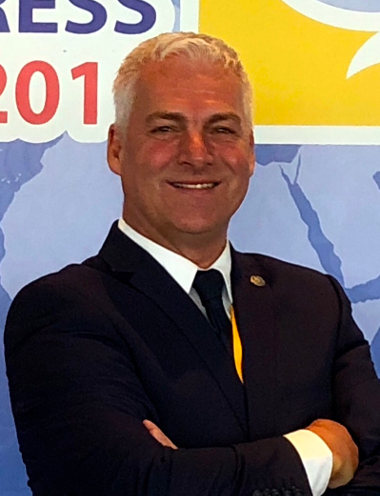 Martin started his enforcement career in 1989 during the Thatcher wars of the Poll Tax uprising. He very quickly became an appointed Sheriffs' Officer for numerous counties including Nottinghamshire.
Martin started his enforcement career in 1989 during the Thatcher wars of the Poll Tax uprising. He very quickly became an appointed Sheriffs' Officer for numerous counties including Nottinghamshire.
He has tirelessly served the Civil Court Justice system in many areas. One such area of expertise that Martin has specialised in since 1995 is through the safe extraction of environmental protestors from their tree top homes and underground tunnels by forming the National Eviction Team.
He was a founding member of the Sheriffs' National Campaign following the Woolf report and the implications for Sheriffs' with the introduction of the Fast Track System.
He was appointed as an Authorised High Court Enforcement Officer in March 2004. Martin has served on the Board of Directors of the High Court Enforcement Officers Association formerly known as the Sheriffs Officers Association.
He currently serves as the chairman of the High Court Enforcement Officers Association having served for two years as the vice chairman. He is also a Group Director of High Court Enforcement Group.
Connexx has its 6th General Assembly in Portugal
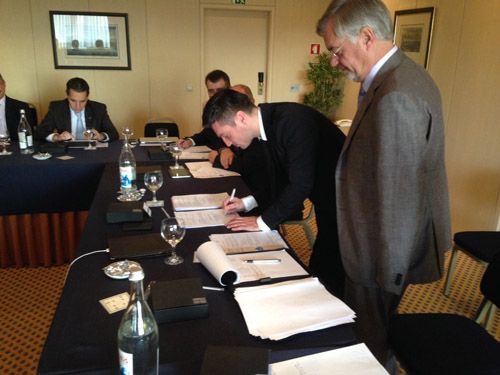
The 6th General Assembly took place in Lisbon Portugal on the 18th of October 2013. The meeting was held at the Altis Hotel and was well attended by member countries. Our President Mr Alex Dockers from Belgium welcomed everyone with discussions lasting until 3:30pm.
During the meeting, we were pleased to welcome Damir Site of Serbia as a full member. Damir is a qualified Lawyer who prefers to carry on his commercial business activities as a Judicial Officer. The system for Judicial Officers in Serbia is still very young, however Damir stated “I am very excited about the future of enforcement in my country, although quite new and currently geographically restricted. As the system of enforcement grows other opportunities will become available, becoming a full member of Connexx will widen my understanding of international enforcement and more importantly it will give me access to a wealth of knowledge and experience”.
 During the meeting our President welcomed Jorge Castello Gasco and his senior associate also known as Jorge Gasco, who are two Justice Officers from Valencia in Spain, known as Procuradores. They explained that the system of civil justice in Spain is very different from other countries and that their function is to work very closely with Lawyers. They can check the current status of any lawsuit, they are also able to access any records during the lawsuit, and provide a forecast on how long the civil case will take. They do however spend a considerable amount of time in Court negotiating the service of documents and legal procedures.
During the meeting our President welcomed Jorge Castello Gasco and his senior associate also known as Jorge Gasco, who are two Justice Officers from Valencia in Spain, known as Procuradores. They explained that the system of civil justice in Spain is very different from other countries and that their function is to work very closely with Lawyers. They can check the current status of any lawsuit, they are also able to access any records during the lawsuit, and provide a forecast on how long the civil case will take. They do however spend a considerable amount of time in Court negotiating the service of documents and legal procedures.
It was very interesting to hear about the enforcement system in Spain, as perhaps it is not as straightforward as one would hope.
As the day progressed, what became very interesting was that each member was invited to give an update on the legal and procedural changes that are due to take place within their respective countries. Marc Schmitz of Belgium informed us that huge changes are immanent; Marc notified us that Belgium’s inner cabinet has decided to merge judicial districts in each and every province, therefore cutting the number of districts from 27 down to 12. The change is one of the biggest for many years. However the end result will see many Judicial Officers merging their businesses to become larger legal entities.
Martin Leyshon of England and Wales informed the members that new legislation will come into effect on April 6th 2014, when a single piece of Bailiff law will replace the 17 different forms of seizure governed by 59 different forms of legislation. It will be known as “Taking Control of Goods Act 2013” Martin stated “it has been a long time coming”.
Connexx members were then treated to a tour of Portugal’s National Chamber of the Procuradores by its President Jose’ Resende. We were very impressed with the professionalism of the Chamber and would wish to thank its President and his team for organising our 6th General Assembly in Portugal.
Serbia

Damir Site Enforcement Officer – Serbia
www.bailiffserbia.com
Below is an outline of how our Office will advance the work on recovering your claim.
Stage 1. Free preliminary case evaluation: We review the case to determine if the company/debtor is still operating as a going concern, confirm the current address and location of the debtor, telephone number, real estate holdings, bank accounts, employment, personal property, financial status and overall credit worthiness, and any information that will allow us to establish an expectation of a positive outcome. There are no field calls and site inspections during this Stage. If we determine a positive outcome is not a plausible expectation, we will make our findings known.
Stage 2. Amicable collection: From time to time we can seek and get the voluntary cooperation of the debtor to pay and satisfy the judgment without any enforcement actions being taken. Any money recovered in Stage 2 will be subject to a negotiable contingency fee, based on a lump sum payment. Stage 2 will usually last no more than thirty days (30). If we are not able to achieve a positive outcome we will proceed to Stage 3. Most clients skip Stage 2.
Stage 3. Civil enforcement proceeding (CEP): There is a government-fixed cost for the CEP and those costs will be presented separately for your consideration and approval. With our findings in Stage 1 & 2, we will proceed to seize, attach and sell property, garnish bank accounts and garnish wages or pensions (if we confirm place of employment), file orders for debtor examinations, post judgment discovery, seize, attach and sell the debtor’s company shares, real estate property, and perform all other civil enforcement actions prescribed by the Serbian 2011 Civil Enforcement and Security Interests Act.
The creditor/client is responsible for pre-payment of all Stage 3 related costs. Court cost and administration fees vary depending on the principal sum that is to be recovered.
These costs and fees will be itemized and presented to the client for their approval. All payments made by the creditor during Stage 3 are enforcement procedural costs that are be recovered from the debtor.
During judgment recovery enforcement proceedings, Serbian laws do not allow any stay of execution, or other legal remedies related postponements of civil enforcement actions, proposed by either of the parties (nor the debtor, or the creditor).
For more information please visit our website.
If what we have to offer is interesting to you we would be delighted to engage in further discussion on how we can launch an effective collection platform. Contact us to tell us about your case.
4th General Assembly
Connexx - European Debt Collection and Enforcement has its formal adoption
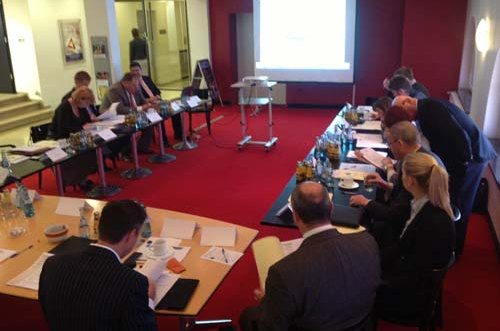
At the 4th General Assembly of Connexx which was held in Stuttgart Germany, located at the offices of one of our members BAYH & FINGERLE a German law firm specialising in debt collection, all members unanimously voted for the formal adoption of the Network’s Articles of Association.
Alex Dockers the President of Connexx stated “that he was very proud of this historic moment for Connexx, and that more importantly from not just an idea, but a demand from creditors all over Europe to have such an organisation, was very gratifying”.
The meeting started at 9am prompt and a lively discussion ensured that all members had their say, Martin Leyshon Vice President stated “that it is this pooling of idea’s from industry leaders within the debt collection and Judicial arena’s from around Europe that will make this Network very successful”.
The meeting concluded at around 4pm in the afternoon, and very grateful thanks was echoed to our hosts, Peter and Joachim Bayh partners of the above mentioned law firm.
For more information on Connexx please contact us at
Connexx holds its 2nd General Assembly meeting in the Netherlands
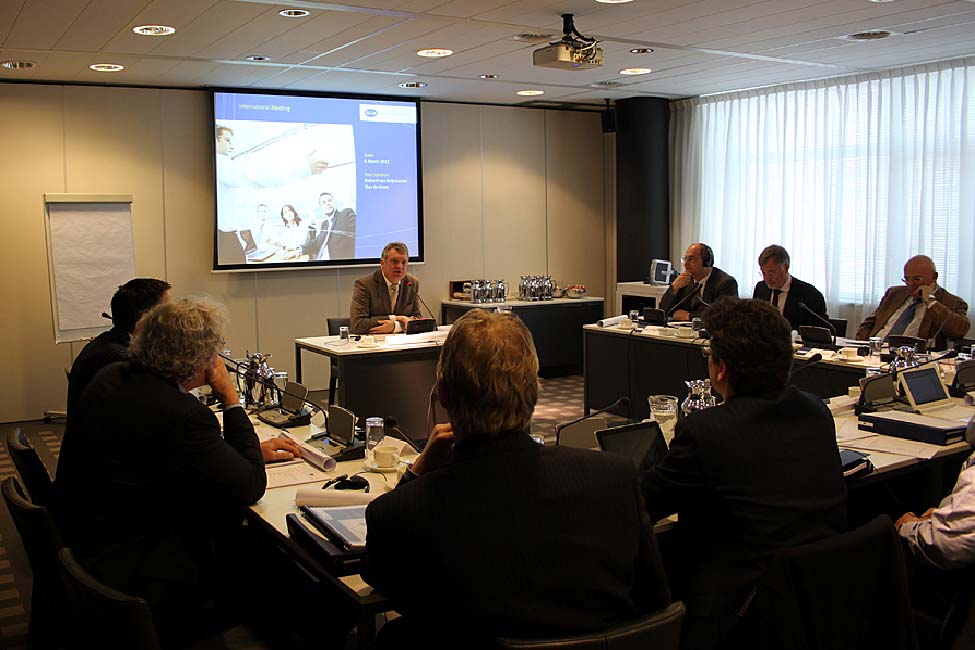
At the officers of GGN international, Connexx members held their 2nd General Assembly. The General Assembly was attended by representatives from 11 different Countries from around Europe. The meeting was chaired by the Chief Executive Officer of GGN, and also attended by the President of the Union International Hussiers de Justice (UIHJ) Mr Leo Netten.
During this meeting, which was only the second of its kind, discussions ensued as to the vision of Connexx, what were the synergies between the different countries involved? How much of a client demand was there for such a network? Did we require Articles of Association? What about a Website? Could we bring together a cohesive Network that could develop a single set of standards? What were the procedures in each Country?
There were a lot of unanswered questions at this stage, however, with a focused perspective and an iron will to succeed, particularly from its inaugural members, and indeed a collective vision, we were able to overcome a number of uncertainties. Representatives from France with the headphones attached, were enjoying instant translation from English to French. The meeting concluded at around 4pm to which the members were treated to a tour of GGN offices. The evening was an occasion were members were able to enjoy some hospitality provided by GGN and really get to know each other, with an eye on building and developing long term business relationships and friendships.
David Walker - representing Scotland. Martin Leyshon - representing England and Wales.
Jean – Dominique, Pierre Pesquet, and Harve Pierson - representing France.
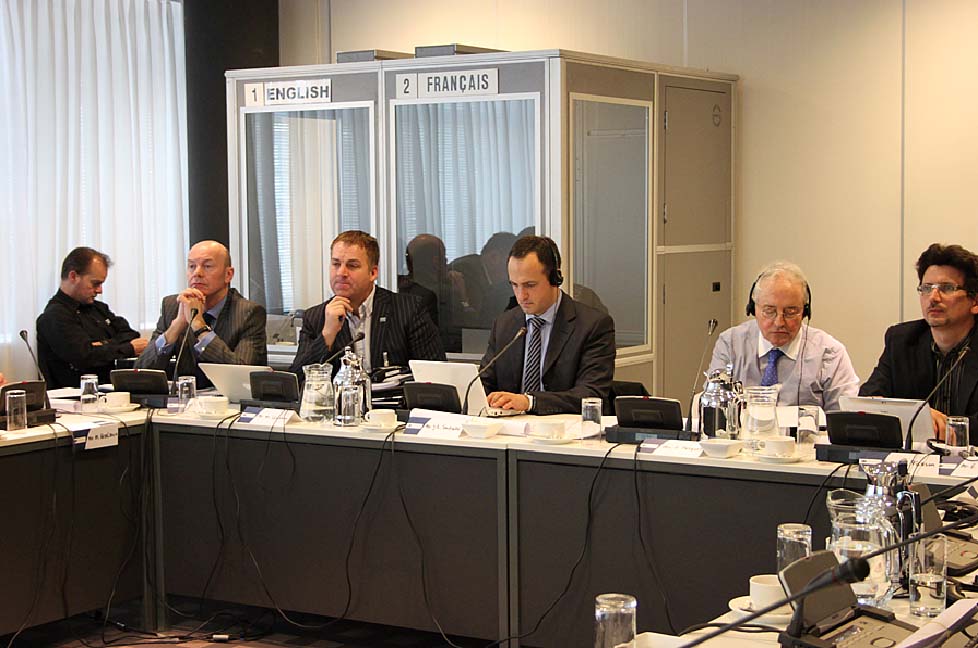
Links

Reditus
www.reditus.info

Czech Republic England and Wales
England and Wales
HCE Group
www.hcegroup.co.uk
 France
France
Leximpact
www.leximpact.net
![]() Ireland
Ireland
Wales & Co Solicitors
www.walesco.ie
Scotland
Walker Love
www.walkerlove.com
 The Netherlands
The Netherlands
GGN
www.ggn.nl
 Germany
Germany
Bayh & Fingerle
www.bayh-fingerle.de
FAQ
How much does this all cost?
For amicable debt collection and enforcement, each country has slightly different laws, and slightly different charges, therefore in all aspects of your instructions we would advise you to ask your Connexx Partner to obtain agreed costs on your behalf in the first instance.
Can you enforce a Judgment that I have obtained in England against someone in France?
The simple answer is yes, our partners in France would prefer to receive a European Enforcement Order (EEO) under article Regulation (EC) No 805/2004 of the European Parliament and of the Council of Europe 21 April 2004, which gives them far greater powers than if it was just for amicable debt collection. However, they like a number of other members would welcome your debt collection files.
Can I instruct a Connexx Partner directly?
Our Articles of the Association Network discourages this practise because it dilutes the strength of Connexx and its members, then of course there are language difficulties and understanding complex European Law and how it functions in other countries. Connexx Partners are encouraged not to step outside the guidelines of its internal regulations.
Why are there no Connexx Partners in every European Country?
That is a very good question, we are working on it, at our last General Assembly in Prague we admitted Slovakia as a full member, there are however a number of other Countries that we have targeted for membership, however we need to ensure that it is the right partner for our network.
Are you already passing work to other Countries?
Yes we are, and with a great deal of success, however the more information we can receive about the debtor at the outset the better chance of recovery we have.
If I am unhappy about anyone of your members can I make a complaint?
Yes you can, within the Articles of the Association Network we have an internal Complaints Procedure that is designed to encourage you to resolve your complaint in an amicable way before we become involved.
If I instruct a member through the Connexx Website will I have a contract with Connexx?
No, your contract will be with the member who you have instructed within your Country who will in turn have a contract with the Connexx partner.
Why do Connexx members have different pricing structures for different judicial activities?
As we said each Country is unique and each Judicial System may have similarities, however, they are all very different, for example in England and Wales the debtor pays, however in France the Creditor pays. There are fixed fees that are laid down in statute and cannot be overcome, and this is perhaps the single reason why fees differ between Connexx members.
Are all Connexx members Judicial Officers?
No, every country is different, however, because of the experience of a Judicial Officer or High Court Enforcement Officer (in England and Wales) when selecting a Country to become a partner we would firstly look at their enforcement and Judicial system, an example of this would be Germany, all Bailiffs are employed by the Government, therefore we will then look at a Law firm who specialises in debt recovery, failing that we would consider a debt recovery company.
Currently we have a mix of Judicial Officers and Lawyers.
What challenges have you had in setting up Connexx?
The initial challenges was our early meetings that were held in English and French, we had professional interpreters in attendance at a great cost to the members, however, during one of our General Assembly meetings we decided to hold all future meetings in English. That is one of the many challenges we have had in setting up this network.
For more information on Connexx, please contact us at
What we offer
 Connexx is a collaboration between different European partners who are all specialised in collecting outstanding debts, in their respective countries.
Connexx is a collaboration between different European partners who are all specialised in collecting outstanding debts, in their respective countries.
Connexx is a “quality trademark” that guaranties the processing of your cases within other countries in Europe, contacting your debtors in a correct manner, swiftly carrying out your cases and obeying the laws, this is possible through a vast network of local Judicial Enforcement Officers and other competent partners.
Connexx’s main goal is to collect your outstanding debts as efficiently as possible, while centralising the process, together with a pre-legal and legal obligation.
The Network will accomplish its goals via the commitment of its members in an extensive partnership and a unified working method, to ensure that clients will be provided with an optimal, well organised service and with the best treatment of their debt-claim.
All members have committed themselves to promote the activities and possibilities of the Network.
So if you have outstanding debts in any of our countries listed please get in touch immediately with the Connexx member of your country, and put the P back into profit.
You can obtain their contact details by just clicking on the Countries link.
Or for more information please contact us at
England and Wales

High Court Enforcement Group Limited www.hcegroup.co.uk 
Tel No +44 17972 466771
We are Judicial Officers known in the UK as High Court Enforcement Officers and Enforcement Agents.
We specialise in Judgment Enforcement and have partners who will collect your amicable debts
We practice under a Limited Company
We specalise in the following:
· Judgment enforcement the most common enforcement
· Serving of documents
· Land and property evictions
· Government and local government collections and enforcement
· Investigations
· Training
· Insolvency checks for individuals and companies
· Land registry checks without a title
· Amicable debt collection via one of our partners without a title
Our jurisdiction is England and Wales.
Some of the costs of our services are laid down in statute and other costs are on a case-by-case basis. We suggest that you contact us for a specific quotation.
The Netherlands

GGN
Amicable debt collection, pre-legal specialists and dedicated legal practice in enforcement proceedings: GGN has it all in-house. A unique combination making us a broadly based and trendsetting organisation in the area of credit management and debt recovery.
Operating nationwide

GGN has 6 offices and 40 judicial officers operating across the Netherlands. Over the years we have built up a valuable network where thorough knowledge of local markets and regional legislation are key.
Expert staff
In total, our organisation counts some 500 employees, among them more than 40 judicial officers, 250 collection specialists and 15 lawyers. In addition, GGN operates an extensive network.
Business-wise judicial officers
We understand what business is about and we know what is important to you. Our expertise is based on what matters to business. We help you to achieve your goals swiftly and smoothly.
International claims
We have significant experience in collecting international debts and solving related issues under private international law. This covers the areas of international commercial contracting as well as procedural law (including attachment and execution law and arbitration). We counsel and litigate with regard to the distribution and purchase, sale and delivery of the most diverse goods and services, from manufacturer to end user. We are internationally oriented and we have a well-established informal network of law firms spanning the globe.
Debt collection in the Netherlands
In the Netherlands, payment default cases are handled by debt collection agencies and judicial officers. The difference between the two is that there is no specific legislation applying to debt collection agencies and that the judicial officer is
a protected profession. After a four-year university education, the judicial officer is appointed by the Crown. There is no zoning in the Netherlands; all judicial officers are entitled to take official action anywhere in the Netherlands.
Amicable debt collection procedure
1. In the Netherlands it is normal to first try to collect an outstanding claim out of court. The Dutch are inclined to pay, only if they have received various reminders and payment request. The amicable debt collection process generally consists of written reminders, emails with payment links and a payment demand by telephone. This process begins with the so-called “fourteen day letter” or pre collection letter; this letter gives the debtor another fourteen days to settle the claim without additional costs. If timely payment fails, the creditor is entitled to increase the demand with collection costs established by law. Those costs vary from €40 to €6.775 depending on the principal amount to be collected, and in most cases VAT. These costs are for the account and risk of the debtor.
Here you can calculate the collection costs: https://www.kbvg.nl/gerechtsdeurwaarders/kosten/incassokosten-calculator
Judicial procedures
If payment remains outstanding, one can revert to court proceedings. Proceedings concerning claims up to €25,000 can be handled completely by the court bailiff at the district court. Only if the claim is higher than €25,000 it is required to institute proceedings via an attorney in the civil courts.
Once a Dutch debtor has been served a summons, he has six weeks to respond to it and most debtors avail themselves of the right to prolong this period by six weeks. The court will then set a date for an oral hearing, which will take place another three to four months later. In practice, this means that any oral hearing will take place six to eight months after the summons was issued.
If the disputes can’t be settled during the oral hearing, the parties will need to institute further proceedings and any witnesses will then need to be heard. In such cases, the procedure will last twelve to eighteen months. The legal costs are made up of the following components:
• summons at €76,17 plus 21% VAT
• court fee (depending on the principal amount and the claimant)
• attorney’s fees (depending on how the procedure runs and the number of procedural stages)
Roughly one can expect legal costs of around €750 to €1,000 in district court. Generally, the debtor is ordered to pay those costs. The costs of instituting proceedings via a lawyer can quickly increase from € 2,000 to € 5,000. In complex cases costs can add up quickly, in which case the debtor will normally be ordered to pay part of the costs, given the fact that the costs actually incurred will always be higher.
Undisputed claims
An alternative procedure is the European Payment Order (EPO) as long as the claim is undisputed and there is a clear cross-border element given. The court fees due are the same as the court fees charged in substantive proceedings, but the EPO Procedure takes much less time. In addition, there are no costs charged for the summons, but a form does need to be served twice on the debtor.

